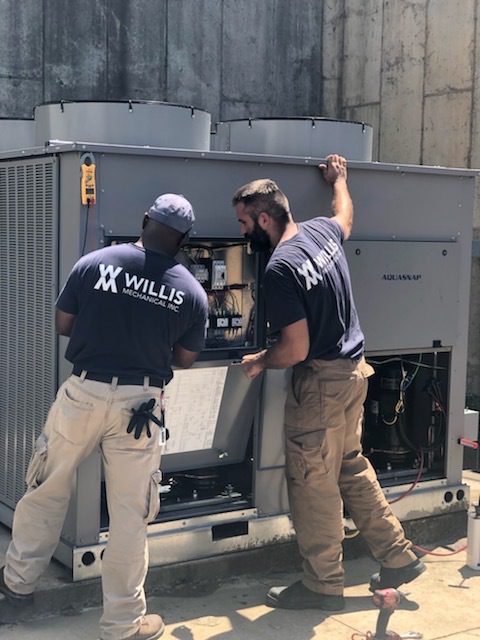Replacing Air Cooled Chillers in Commercial and Industrial Settings: Enhancing Infrastructure and Ensuring Efficiency
When it comes to replacing air-cooled chillers in commercial and industrial settings, careful consideration of various factors is essential. Air-cooled chillers play a crucial role in maintaining optimal indoor temperatures and ensuring the smooth operation of HVAC systems. In this comprehensive guide, we will explore the operation of air-cooled chillers and discuss key considerations when replacing them, including capacity, sound levels, electrical requirements, flow rates, dimensions, compressor types, economizers, cooling stages, and the opportunity to strengthen infrastructure through redundancy. Additionally, we will highlight the importance of advanced phase monitors to protect against power spikes in the Atlanta area/Georgia power grid.
- Operation of Air-Cooled Chillers: Air-cooled chillers remove heat from the indoor environment through the refrigeration cycle. They utilize fans to draw air across the condenser coils, dissipating heat into the atmosphere. This eliminates the need for water cooling, making air-cooled chillers a popular choice in commercial and industrial applications.
- Considerations When Replacing Air-Cooled Chillers: a) Capacity: Determining the appropriate chiller capacity is crucial for meeting the cooling demands of the space. Factors to consider include peak load conditions, occupancy, equipment heat gain, and future expansion needs. b) Sound Levels: Noise levels can impact occupant comfort and nearby noise-sensitive areas. Selecting chillers with low sound ratings ensures a quieter environment. c) Electrical Requirements: Understanding the electrical capacity and available power supply is vital for selecting a chiller that matches the electrical infrastructure of the facility. d) GPM Flow and Delta T on the Evaporator: Proper water flow rates and temperature differentials on the evaporator coil are essential for efficient heat transfer and chiller performance. e) Physical Dimensions: Assessing the physical space available for the chiller is crucial to ensure a proper fit and ease of installation. f) Compressor Types: Consider different compressor types, such as reciprocating, scroll, or screw, based on efficiency, reliability, and maintenance requirements. g) Economizers: Incorporating economizers can enhance energy efficiency by utilizing outdoor air for cooling during favorable conditions. h) Stages of Cooling: Multi-stage cooling systems provide flexibility and energy savings by allowing the chiller to operate at partial loads during periods of lower cooling demand.
- Strengthening Infrastructure Through Redundancy: The replacement of air-cooled chillers presents an excellent opportunity to strengthen the infrastructure and minimize downtime. Adding redundancy, such as an extra chiller and pumps, ensures uninterrupted cooling even in the event of chiller failure or maintenance requirements. Redundancy safeguards against production disruptions, protects critical processes, and maintains occupant comfort.
- Advanced Phase Monitors for Power Protection: The Atlanta area and Georgia power grid may experience power spikes, which can adversely affect equipment performance and lifespan. Installing advanced phase monitors as part of the chiller replacement project helps protect against power fluctuations, voltage imbalances, and phase loss. These monitors provide real-time monitoring and protective measures, safeguarding the chiller and associated equipment.
Replacing air-cooled chillers in commercial and industrial settings requires careful consideration of various factors to ensure optimal performance and efficiency. Understanding capacity requirements, sound levels, electrical considerations, flow rates, dimensions, compressor types, economizers, and cooling stages is crucial. Additionally, taking advantage of the replacement process to strengthen infrastructure through redundancy enhances reliability and minimizes downtime risks. Lastly, the installation of advanced phase monitors protects against power spikes in the Atlanta area/Georgia power grid, safeguarding the chiller and supporting equipment. By addressing these considerations, businesses can ensure efficient cooling operations, maintain productivity, and enhance the longevity of their HVAC systems.

